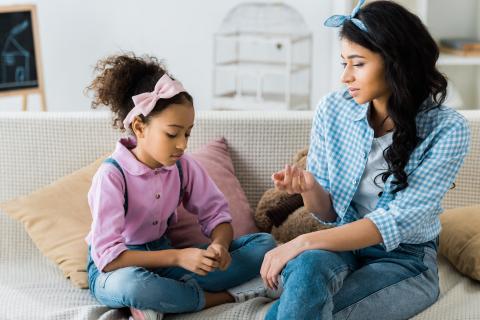Bright Futures
Articles and Updates from Phoenix Children's
Tips for talking to kids about tragedies
The young people in your life may have questions about the tremendous loss of life and senseless tragedies they have heard or seen on the news. If you are wondering what to tell your child or teenager, you are not alone. Navigating these feelings for yourself, as well as for your child, is delicate and complex.
The Child Life team at Phoenix Children’s offers these tips and resources for speaking to your own children regarding tragedies:
- Talk to your children about what they already know. This is an opportunity to address any misconceptions or fears they might have. Provide accurate, developmentally appropriate information based on your child's questions. Young children may benefit from more brief explanations, while older children or teens may need more explanation.
- Discuss safety. Help reassure your child they are safe, while also validating their feelings around this event. You might help your child to find all the "helpers" who came to assist in this crisis. Lastly, it may be beneficial to reiterate your child's awareness of safety procedures if there was an emergency, such as identifying exits or calling 911.
- Limit exposure to media. The ease of access to media can be both helpful and harmful. When it comes to your children, limiting repeated exposure and graphic details of a tragic event is important. Although children will get more general information from you, repeatedly hearing details of a tragedy on the news may cause additional worries.
- Monitor feelings. Talking about your feelings, as well as your child's, can be incredibly powerful. Normalize that feelings such as sadness, nervousness, and anger are okay when something terrible happens. Talking about how you feel is also important and may allow your child to feel comfortable discussing feelings that are present for them.
- Let them know questions are okay. This is not a one-time conversation. Depending on their development, children will go "in and out" of hard conversations. They may ask questions, go play, and then come back and wonder, "But what about this?" Reassure them that you are there for them and will continue to support them.
More in-depth information about how to support the children in your lives is available at the following links:
- Talking With Children About Tragedies & Other News Events – American Academy of Pediatrics
- How to Talk to Kids About School Shootings – Child Mind Institute
- Helping Children Cope with Frightening News – Child Mind Institute
- Talking to Children About Violence: Tips for Parents and Teachers – National Association of School Psychologists
Please keep in mind that taking care of our own emotional well-being during a time of tragedy is essential in order to continue caring for others.


